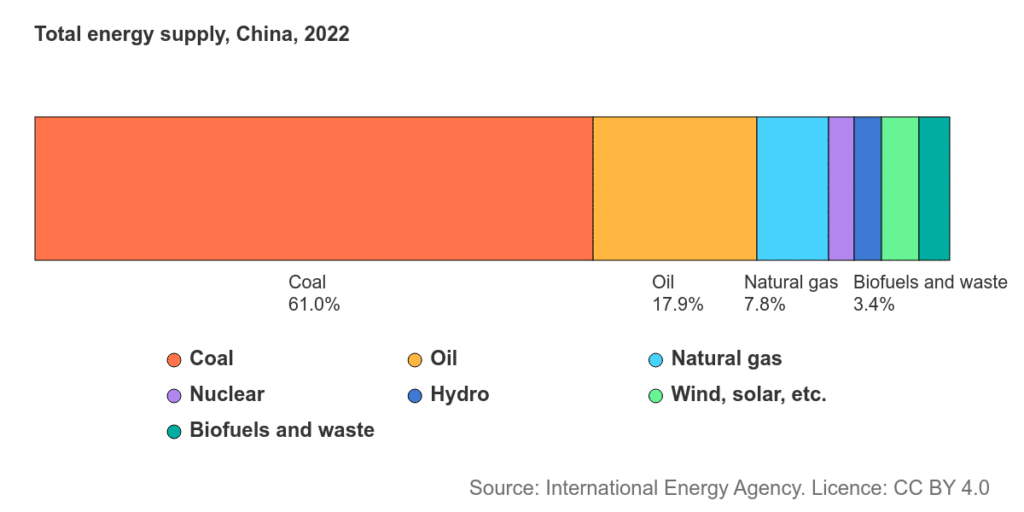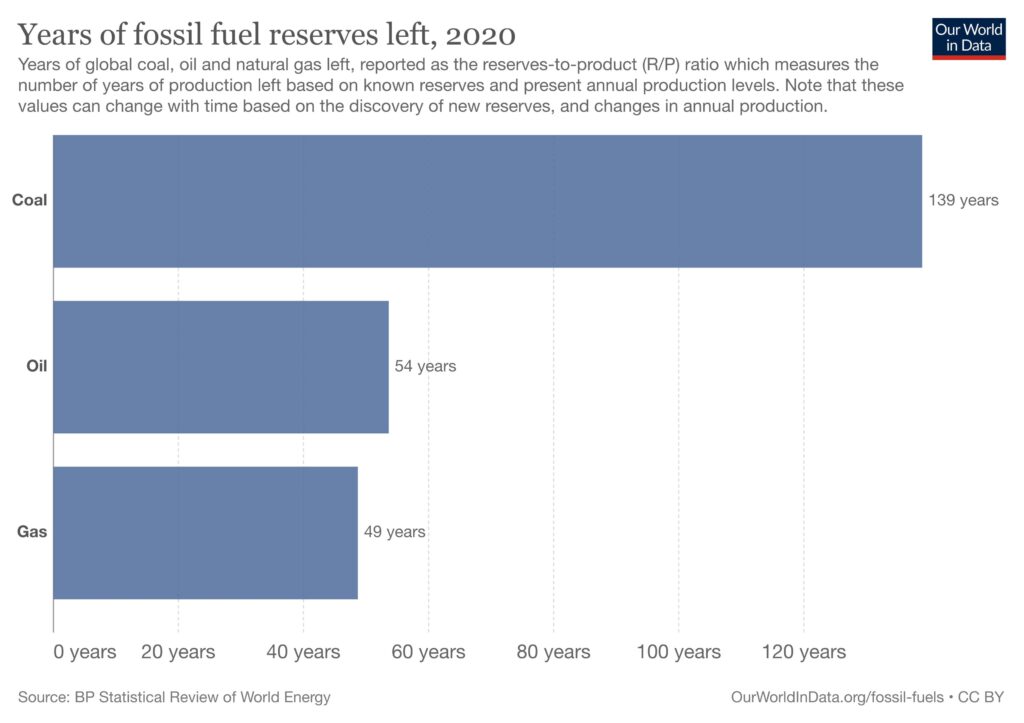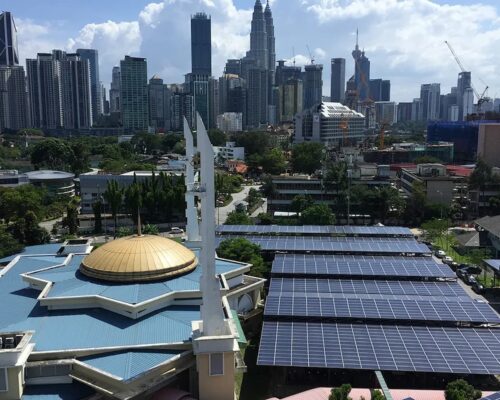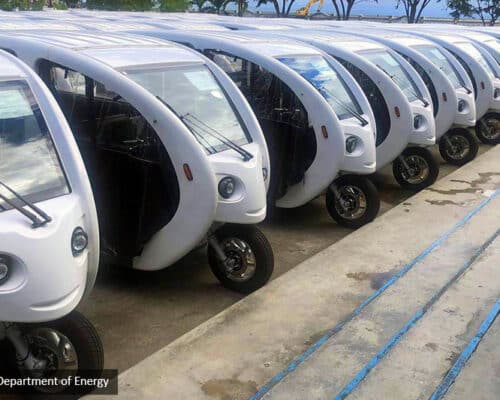When Will Fossil Fuels Run Out?
Source: The Roosevelt Institute
19 December 2024 – by Eric Koons
When will fossil fuels run out? This is a critical issue shaping the future of the world’s energy security, economy and environment. The exponential increase in global energy consumption, driven by population growth and industrialisation, means that the once-abundant coal, crude oil and natural gas supplies are under mounting pressure. The US Energy Information Administration notes that global energy demand will rise by up to 57% by 2050.
These fossil fuel resources take millions of years to form and are finite, and their availability is reducing. Understanding when these fuels might run out isn’t just a matter of curiosity – it’s a call to action to switch to renewable energy sources.
The Problem of Global Demand for Fossil Fuels
Global consumption of fossil fuels is at the highest point in history and accounts for approximately 80% of the world’s primary energy. Rapid industrialisation and economic growth, particularly in emerging markets, have accelerated the hunger for cheap, readily available energy sources. Countries like China and India rely heavily on coal. While both are making strides in renewable investments, the sheer scale of their electricity demand keeps fossil fuels firmly in the picture.

This reliance, however, is unsustainable. Burning fossil fuels releases greenhouse gases and other pollutants, contributing to climate change, air quality degradation and associated health problems. Moreover, geopolitical tensions often flare around resource-rich regions, creating vulnerabilities in the supply chain and leading to price volatility.
How Much Fossil Fuel Is Left?
Estimating how much coal, oil and natural gas is left is complex. However, fossil fuels are indeed running out. Proven oil reserves stand at around 1.65 trillion barrels globally, which, at current consumption rates, could last roughly 40 to 50 years. Coal’s known reserves could stretch to about 130 years, while natural gas reserves may extend supply for around 50 to 60 years under current demand scenarios. But these figures are moving targets. Technological advancements, like improved drilling techniques, can prolong the lifespan of reserves, while rising environmental standards and shifting policies can shorten it.

Predictive models can also factor in geopolitical uncertainties and the pace of discoveries. However, all major energy research bodies agree that fossil fuel reserves are finite and depleting. Even if new resources are found, the easy-to-reach, high-quality deposits have primarily been tapped, leaving more challenging, expensive and environmentally risky extraction ahead.
The End of Fossil Fuels
Several indicators point towards easily accessible fossil fuels running out. The concept of “peak oil” – once a fringe theory – has gained mainstream traction. While we may not have hit a perfect peak yet, many experts believe that the most accessible oil fields have already been discovered and are maturing. For example, giant fields in the Middle East and elsewhere now rely on enhanced recovery techniques rather than straightforward extraction.
As extraction becomes tougher and more costly, investors and governments increasingly seek renewables. A report by BloombergNEF shows that solar and wind power are now the cheapest form of new electricity in most markets. With climate targets such as the Paris Agreement pushing for carbon neutrality, the economics of fossil fuels are shifting.
When Will We Run Out of Oil?
Oil is often the focal point of depletion forecasts compared to other fossil fuels. If current consumption remains steady – about 100 million barrels per day – known reserves might last another five decades. Yet this estimate doesn’t account for factors like surging electric vehicle (EV) sales in China (over 6.8 million EVs sold in 2022) or shifts toward biofuels and hydrogen. Political upheavals in oil-rich regions or sudden policy changes could either shorten or prolong that timeline.
Dwindling oil supply could mean higher prices and vulnerabilities in supply chains for Asia’s industries and transport networks. This underscores the urgency for diversifying the energy mix, especially as rising standards of living push vehicle numbers, and thus, oil demand higher in several Asian nations.
When Will We Run Out of Coal?
Coal is by far the most polluting fossil fuel. Coal is abundant yet faces an accelerating decline due to environmental regulations and market competition. Current estimates suggest that global coal reserves might last over a century, but that’s hardly reassuring. Many reserves are in remote locations, are challenging to mine economically or face mounting environmental opposition.
Coal still dominates the power sector in Asia: China consumes more than half of the world’s coal supply. But with increasingly strict emissions standards, renewable energy price drops and carbon pricing, coal’s future is dimming faster than expected. As Asian economies strive for cleaner air and compliance with international climate commitments, retiring coal plants become an economically viable choice, leaving previously counted reserves potentially stranded.
When Will We Run Out of Natural Gas?
Natural gas has often been marketed as a “transition fuel” due to its relatively lower emissions than coal or oil. At current rates, the known gas reserves may last about 50 to 60 years, with significant reserves in Russia, the Middle East and North America. Asian nations are increasingly importing LNG, boosting their energy flexibility. Yet, this convenience comes at a price. While gas might outlast oil, it remains a finite resource subject to price volatility and geopolitical influence, which the 2021 price spike highlights.
For Asia, the strategic choice of gas-fired power plants – considered cleaner and more flexible – must be balanced against the long-term goal of achieving carbon neutrality. Infrastructure investments made today could become stranded assets as the region pushes harder towards renewables in the coming decades.
How Can We Address Fossil Fuel Depletion?
Ultimately, the exact timeline for when coal, oil and gas will run out remains uncertain. But the direction is clear: as reserves dwindle and environmental costs mount, continuing our reliance on fossil fuels is neither wise nor sustainable. The answer to “When will fossil fuels run out?” lies not just in geological formations and extraction technologies but in our collective willingness to embrace alternatives.
The path forward involves accelerating investments in solar, wind, hydro and emerging clean technologies. Governments and industries must implement supportive policies, encourage innovation and scale up manufacturing capacities for renewable energy and energy storage. This proactive approach will strengthen energy security, fight global warming, deliver long-term economic growth and protect the environment for future generations.
by Eric Koons
Eric is a passionate environmental advocate that believes renewable energy is a key piece in meeting the world’s growing energy demands. He received an environmental science degree from the University of California and has worked to promote environmentally and socially sustainable practices since. Eric’s expertise extends across the environmental field, yet he maintains a strong focus on renewable energy. His work has been featured by leading environmental organizations, such as World Resources Institute and Hitachi ABB Power Grids.
Read more








